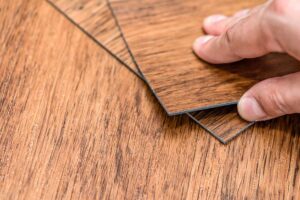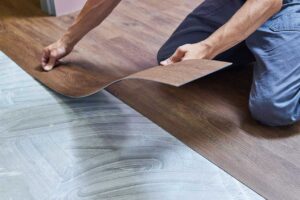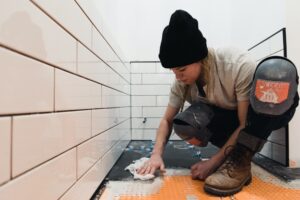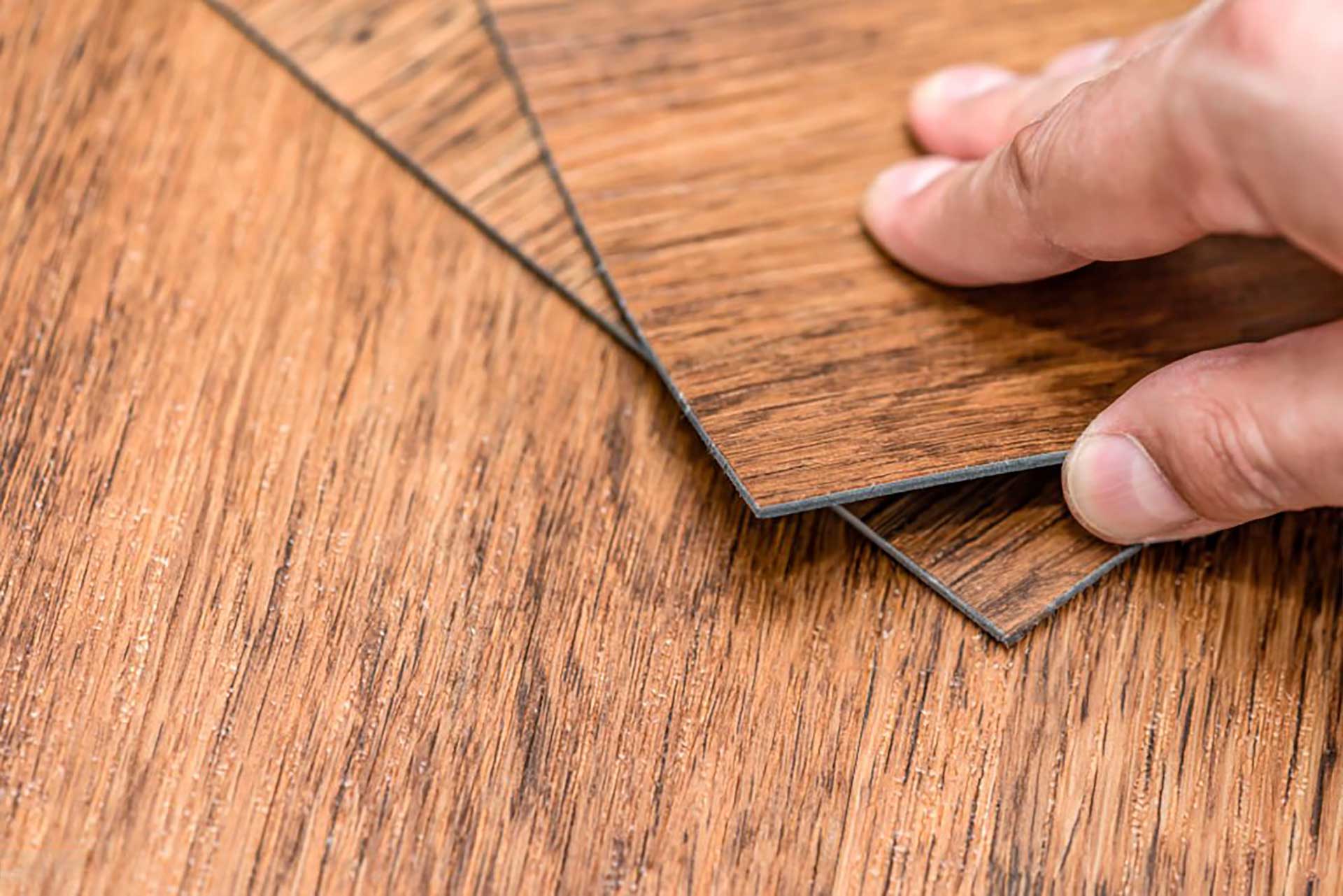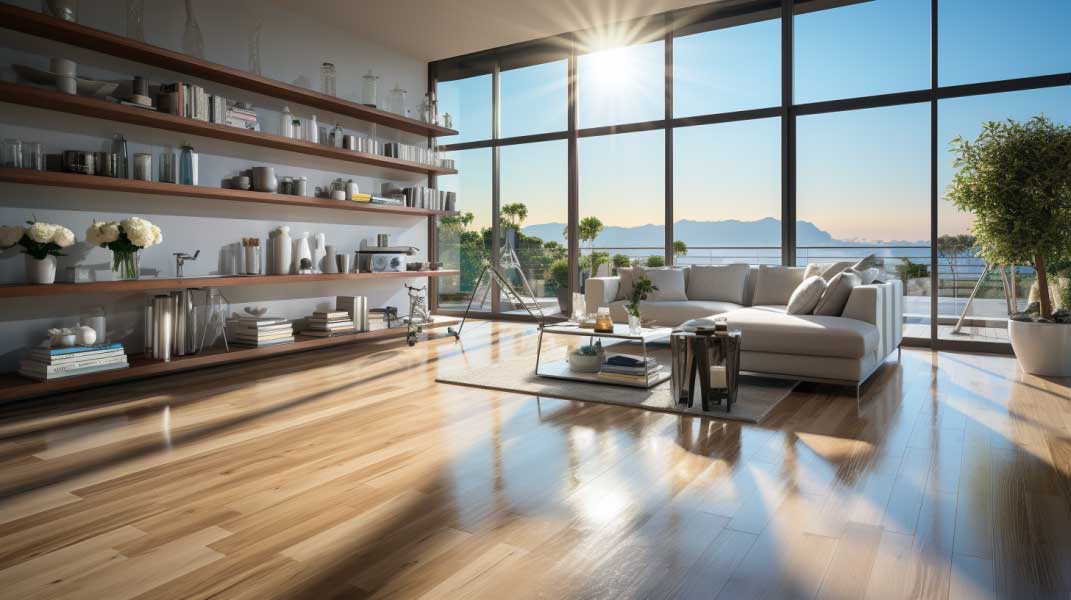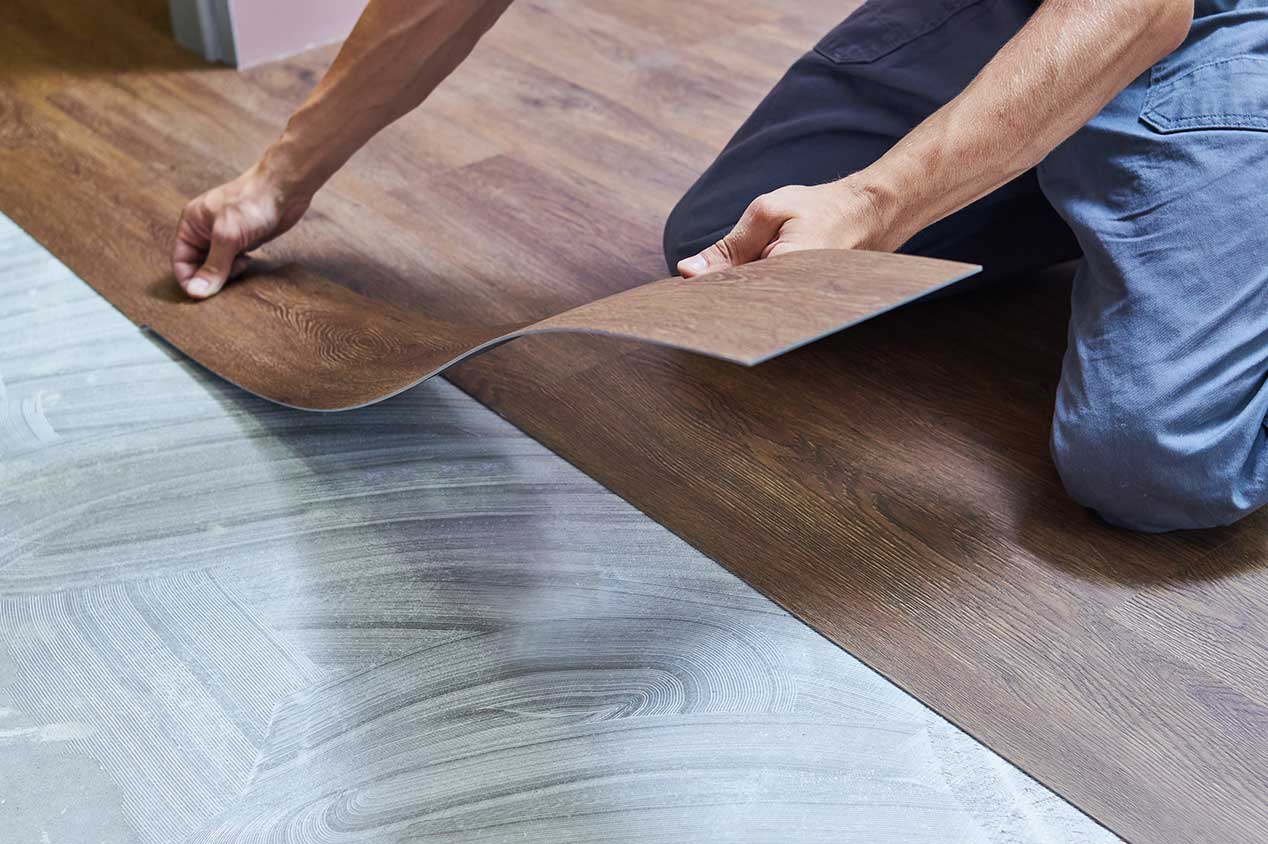Picking the perfect flooring for your commercial property can be perplexing. From LVT to VCT, you’re sure to be puzzled about which one to choose. Let’s compare the two and break down the benefits, installation process, cost comparison, and maintenance tips to ensure you pick the perfect flooring for your space.
Benefits of LVT
When considering the best type of flooring for a commercial property, one of the most important benefits of LVT is durability. LVT stands up to wear and tear better than many other flooring materials, making it an excellent choice for high-traffic areas. Additionally, LVT is highly versatile and requires little maintenance, making it a great choice for a commercial property.
Durability
With its robust construction and protective wear layer, LVT flooring is designed to last for years. A protecting finish helps to prevent mold, stains, and scratches from day to day use. This makes it perfect for long term use in commercial properties, and is resistant to temperature fluctuations which can cause expansion, and scuffs and marks from heavy foot traffic. It is also antimicrobial, so it can prevent the growth of bacteria and mold, and its easy to clean and maintain. LVT flooring offers an excellent combination of style, strength, and durability for commercial properties, making it an ideal choice for long-term use.
Versatility
Beyond its durability, LVT flooring also offers exceptional versatility. Its long term flexibility allows for a range of visual appeal, from traditional wood looks to interesting ceramic tile designs. The installation process is also typically faster compared to VCT, with less environmental impact and a cost-effective solution for commercial properties. Additionally, the floor is easy to clean and maintain, making it a great choice for busy businesses. LVT is also a great choice when it comes to remodeling, as it can be removed and replaced with ease. All of these attributes give LVT an edge over VCT, making it an excellent choice for commercial properties.
Low-Maintenance
Not only is LVT flooring durable and versatile, but it also provides a low-maintenance option for busy commercial properties:
-Protecting surfaces with regular cleaning
-Installing correctly to ensure longevity
-Regular polishing to maintain a high-quality finish
-Choosing wisely to maximize design flexibility
LVT is a great choice for commercial properties due to its ease of maintenance. It is designed to be resistant to spills, stains, and abrasions, meaning that it can be cleaned easily and quickly with minimal effort. Additionally, if installed correctly, LVT can last for many years without requiring regular replacement or repairs. Furthermore, regular polishing can keep the floor looking great, while also providing extra protection. Finally, when choosing LVT, businesses can take advantage of its wide range of design options to customize their space to their specific needs.
Benefits of VCT
VCT flooring offers many benefits for commercial properties, such as easy maintenance, a durable finish, and vibrant colors. It is popular among businesses due to its ease of maintenance, which requires no waxing or buffing. The finish is also highly durable and resistant to scuffs, scratches, and other damage. Lastly, VCT is available in a wide variety of colors, allowing you to customize the look of your commercial property.
Easy Maintenance
When it comes to easy maintenance, VCT flooring is a great choice for commercial properties. It offers:
- Polishing techniques to keep it looking new
- Sealing options to protect it from damage
- Slip resistance qualities for safety
- Environmental impact benefits with low installation costs
VCT flooring is extremely low maintenance, making it ideal for busy commercial properties. It is easy to care for and can be regularly cleaned and polished with a floor buffer and specific polishing compounds. Sealing options are also available to protect it from scratches and wear and tear. Plus, it has excellent slip resistance qualities, making it safe for employees and customers. Additionally, its environmental impact is minimal due to the low installation costs. This makes it a great option for businesses looking to reduce their carbon footprint.
Durable Finish
Enjoy the durable finish of VCT flooring for your commercial property. Its quick installation, environmental benefits, soundproofing options, design flexibility, and stain resistance make it an ideal flooring choice for any business. VCT is highly resistant to scratches, dents, and other physical damage, making it a great investment for those who expect high foot traffic in their buildings. It’s also quite easy to clean and maintain, and won’t require frequent waxing or refinishing like other types of floors. Additionally, its design flexibility allows for custom designs that can suit any business’ aesthetic needs. Furthermore, VCT can help reduce noise levels due to its soundproofing capabilities. In conclusion, VCT flooring is the perfect choice for any commercial property due to its durability, design flexibility, and environmental benefits.
Vibrant Colors
With its vast array of vibrant colors, VCT flooring can help give any commercial property a unique and attractive look. VCT flooring offers:
- Vibrant accents and bold designs
- Unique textures and color variations
- Pattern choices to create a custom look
- Endless options to accommodate any style
VCT flooring provides the perfect backdrop for any commercial property, as its vibrant colors and unique textures can provide an eye-catching, custom look. With its vast array of options, VCT flooring allows for countless possibilities when creating the perfect design for any property. VCT flooring also provides the versatility to easily change up the design in the future, allowing for a more dynamic look. Its endless possibilities, vibrant colors, and custom pattern choices make VCT flooring the ideal choice for any commercial property.
Installation Process
When it comes to installation, LVT and VCT differ in both cost and durability benefits. Comparing the two is important in order to make an informed decision on which flooring type is best for your commercial property.
Cost Comparison
Though installation costs for LVT and VCT flooring vary, it’s important to understand the overall cost differences between them. Installation cost can be higher for LVT due to its need for moisture protection and more complex design options. VCT is typically more affordable, making it a great option for budget-minded projects. Price ranges for both types of flooring can vary depending on the size of the project and the complexity of the design. The cost of cleaning and maintaining LVT and VCT should also be taken into account when making a decision. It is important to consider all the costs involved when selecting either LVT or VCT for your commercial property.
Durability Benefits
The installation process of both LVT and VCT flooring can be a deciding factor when it comes to durability benefits, so it’s important to understand the differences. LVT is water-resistant, fire-resistant, and environmentally friendly, making it an ideal choice for commercial properties. The installation process is easy and does not require any special tools. VCT is slip-resistant, scratch-resistant, and offers great value for money. However, the installation process is more complex and requires specialized tools and materials. Both flooring types offer great durability benefits, but the installation process can be the deciding factor when it comes to choosing between the two.
Cost Comparison
When considering flooring options for your commercial property, it’s important to compare the costs of LVT and VCT flooring. The price points of each can vary drastically, as can their durability. It’s worth investigating both to determine which option makes the most sense for your particular project.
Price Points
When it comes to cost, LVT and VCT flooring vary greatly, so it’s important to consider your budget before making a decision. Installation costs, quality comparison, aesthetic impact, and environmental considerations must all be taken into account to make an informed decision.
- Installation cost: VCT is typically less expensive than LVT, but installation is more labor-intensive.
- Quality comparison: LVT has a more luxurious feel and is more durable than VCT, which is often considered a more basic option.
- Aesthetic impact: LVT has a more modern and upscale look, while VCT is more suitable for traditional and basic designs.
- Environmental considerations: LVT is more environmentally friendly than VCT, and can provide long-term benefits.
Ultimately, the decision will depend on the budget, quality, and aesthetic preferences of the commercial property owner.
Durability
While LVT is more expensive to install than VCT, it is also more durable, so it can be a cost-effective solution in the long run.
| Detail | LVT | VCT |
|---|---|---|
| Easy to Clean | Easy | Moderate |
| Wear Resistance | Easy | Moderate |
| Water Resistance | High | Moderate |
| Slip Resistance | High | High |
| Stain Resistance | High | Moderate |
LVT’s superior durability is due to its wear layer which is designed to resist scratches and scuffs, making it ideal for high-traffic areas. Additionally, LVT is highly water-resistant and slips, and stain-resistant, making it easier to clean and maintain. VCT, on the other hand, is less durable and more prone to wear and tear, requiring more frequent maintenance and repair.
Maintenance Tips
Maintaining either LVT or VCT flooring is relatively straightforward and simple. To ensure that your commercial property always looks its best, it is important to clean it on a regular basis and avoid moisture. Furthermore, vacuuming or sweeping regularly is key to removing dirt and debris.
Clean Regularly
Regularly cleaning your LVT or VCT flooring will help keep it looking its best. To ensure it is done properly, it is important to schedule regular cleanings and to use the right chemical treatments. Deep cleaning of the floor should also be done regularly as well. Here are some tips for cleaning:
- Use floor mats to reduce the amount of dirt and debris entering the business.
- Ensure that cleaning solutions are appropriate for the floor type.
- Use a vacuum or mop to clean the floor regularly.
- Dry the floor completely to avoid any water damage.
Avoid Moisture
In addition to regularly cleaning your LVT or VCT flooring, it’s important to also make sure that moisture doesn’t build up on it. The best way to do this is to ensure the flooring you choose has properties that make it moisture-resistant or water-resistant. Climate proofing is also important, as it can prevent mildew from forming in more humid climates. Additionally, slip resistance is a must when it comes to flooring and moisture. This means that your flooring should have a textured finish that won’t become slippery when wet. To ensure your LVT or VCT flooring is up to all of these standards, be sure to check the product’s specs before buying.
Vacuum/Sweep
To keep your LVT or VCT floor looking its best, regular vacuuming/sweeping is a must. For quick and easy maintenance, here are some tips:
- Vacuum or sweep the floor regularly to remove dirt and dust
- Use a damp mop on the floor occasionally to protect from moisture
- Invest in good quality mats at entryways to reduce wear and tear
- Have a professional installer apply a sealer for stain prevention
Vacuuming/sweeping is key to protecting your floor from moisture and wear damage, as well as keeping it looking great. As you choose the perfect LVT or VCT floor for your property, keep in mind the color selection, installation tips, and stain prevention methods. With the right maintenance routine, you can ensure that your new floor will be a long-lasting part of your property’s look and feel.
Frequently Asked Questions
How Long Does LVT and VCT Flooring Typically Last?
LVT and VCT flooring typically last for many years, depending on the cost efficiency, maintenance requirements, slip resistance, acoustic benefits and aesthetic appeal. Both are reliable and durable, but LVT has the advantage of being more cost-efficient and easier to maintain.
Is There a Difference in the Durability of LVT and VCT Flooring?
Comparing durability, LVT and VCT have different cost comparisons, installation processes, maintenance requirements, design options, and sustainability impacts. You must consider all of these factors to determine which is best for your needs.
Is One Type of Flooring Easier to Clean Than the Other?
When it comes to cleaning, LVT is generally easier to maintain and requires less frequent cleaning than VCT. It’s also more water resistant, making it a better choice for areas prone to moisture. Additionally, LVT is more soundproof, while installation costs may be higher.
Are There Any Health Concerns Associated With Either Type of Flooring?
When considering health concerns, emissions impacts, indoor air, chemical exposure, sound insulation, and thermal insulation are all important to consider between LVT and VCT flooring. Both can have implications for health, so it’s important to research before deciding.
Are There Any Environmental Benefits to Choosing Either LVT or VCT Flooring?
When comparing LVT and VCT flooring, cost comparison, noise levels, installation options, maintenance requirements, and aesthetic impact should be considered. Each option has environmental benefits, such as lower noise levels and durability, that can make your property more eco-friendly.

